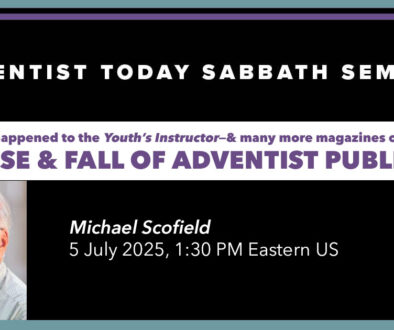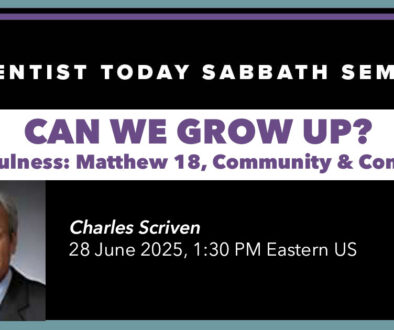ATSS: Adventism and the Cosmic Week Theory
27 April 2022 |
by Laurence Turner
The “Cosmic Week” in Seventh-day Adventism
Seventh-day Adventism arose in the aftermath of the Great Disappointment of 1844. Despite numerous “proofs” culled from Scripture, used confidently to pinpoint the date of the second advent to October 22, 1844, Christ did not return. This failure of chronological calculations ensured that official Adventism would never predict a precise time for Christ’s return but rather maintain faith in its imminence. However, within unofficial Adventist tradition the fascination with eschatology, refining “imminence” to a more specific time, lived on. This week’s Adventist Today Sabbath Seminar focuses on one facet of this tradition, namely the “cosmic week”. With some variations, this holds that the seven days of creation week in Genesis 1 prefigure seven thousand years of earth’s history. So, just as the six days of God’s creation were followed by the Sabbath on the seventh day, so six thousand years of human history will be followed by a final millennium (Rev 20), that is, the seventh millennium since creation. This view has recently gained traction in popular Adventism, promoted in particular by online ministries. Several claim that the end of the six thousand years and beginning of the seventh will occur in (approximately) 2027, and thus pinpoints the date for Christ’s return. What follows provides a brief initial assessment of this belief.
What does the New Testament have to say about the timing of Christ’s return? Matt 24:36‒44 is an instructive passage.
But about that day and hour no one knows, neither the angels of heaven, nor the Son, but only the Father. For as the days of Noah were, so will be the coming of the Son of Man. For as in those days before the flood they were eating and drinking, marrying and giving in marriage, until the day Noah entered the ark, and they knew nothing until the flood came and swept them all away, so too will be the coming of the Son of Man. Then two will be in the field; one will be taken and one will be left. Two women will be grinding meal together; one will be taken and one will be left. Keep awake therefore, for you do not know on what day your Lord is coming. But understand this: if the owner of the house had known in what part of the night the thief was coming, he would have stayed awake and would not have let his house be broken into. Therefore you also must be ready, for the Son of Man is coming at an unexpected hour. (NRSV)
Matt 24 has a time-honored place in Adventism as a source for the “signs of the times”, but these do not have the function of enabling time-setting for the second advent. Note two clear emphases in the passage. On the one hand, there are many references to time periods, i.e., “day/days”, “hour/hours”, “part of the night”. Yet, these do not serve any chronological purpose, that is, a framework for pinpointing when Christ will return. This is clear from the second major emphasis: nobody knows when he will return. Christ says, “you do not know on what day your Lord is coming”; “for the Son of Man is coming at an unexpected hour”. If the “signs” enabled us to pinpoint the second advent then we would know and his coming would not be unexpected.
Some appeal to 1 Thess 5:1‒5.
Now concerning the times and the seasons, brothers and sisters, you do not need to have anything written to you. 2 For you yourselves know very well that the day of the Lord will come like a thief in the night. 3 When they say, “There is peace and security,” then sudden destruction will come upon them, as labor pains come upon a pregnant woman, and there will be no escape! 4 But you, beloved, are not in darkness, for that day to surprise you like a thief; 5 for you are all children of light and children of the day; we are not of the night or of darkness. (NRSV)
Note that in v. 4, Paul says the day will not surprise believers like a thief. Thus, some say, we will know the time of his coming. But this misunderstands the passage. In v. 2, Paul repeats Christ’s view that “the day of the Lord will come like a thief in the night”. Paul then picks up the detail of “night” in that verse and expands on it. “You, beloved, are not in darkness…for you are all children of light and children of the day; we are not of the night or of darkness” (vv. 4‒5). So, Paul’s meaning is clear. The day of the Lord will not surprise believers as it does others. Non-believers assume “peace and security” (v. 3) will continue, irrespective of how they live, while believers, of course, do not. Paul’s point is not that believers will know the time of the second coming but rather, they will have nothing to fear.
Believers are people who already live in the light; they are no longer in the darkness of sin and ignorance. Consequently, for them the day of the Lord will not come like a searchlight which reveals the sins committed under cover of darkness and which makes unbelievers want to hide or run away. On the contrary, they will welcome the fuller light of that day, and they will not be like people taken unawares because they will not be doing the kind of things that lead to judgment. (I. Howard Marshall, New Bible Commentary, p. 1282.)
The cosmic week concept, currently gaining momentum in some Adventist quarters, directly challenges the biblical positions set out above. How it does so, how we should respond, and what difference it makes, we will explore in the seminar.
Teacher:
Laurence Turner is Principal Lecturer Emeritus in Old Testament at Newbold College of Higher Education.
Moderator:
Bjorn Karlman.
How to join:
One-click link: https://us06web.zoom.us/j/87301147637
Passcode: He was known for his stylish coat of many colors, which made his brothers jealous SIX CHARACTERS, ALL CAPS.
ATSS starting time depends on where you are. If you’re on the west coast of the United States, it’ll be 10:30 AM. On the east coast, 1:30 PM.
Times around the world:
-
- Reykjavík: 6:30 PM
- College Place: 10:30 AM
- Lincoln: 12:30 PM
- Denver: 11:30 AM
- Bracknell: 6:30 PM
- Loma Linda: 10:30 AM
- Nairobi: 8:30 PM
- Gackle: 12:30 PM
- Hosur: 11:00 PM
- Waco: 12:30 PM
- Tulsa: 12:30 PM
- Helsinki: 8:30 PM
- Stockholm: 7:30 PM
- Hamburg: 7:30 PM
- Cape Town: 7:30 PM
- Madrid: 7:30 PM
- Paris: 7:30 PM
- Honolulu: 7:30 AM
- Cooranbong: 5:30 AM (Sunday)
- Perth: 2:30 AM (Sunday)
The class is intended to last about 2 hours, though the conversation often continues to 4 PM on the east coast of the United States.
About our class:
- The AT Sabbath Seminar is intended to be a courteous forum. We discuss and ask questions politely. We don’t accuse, get angry, or put people down.
- Stick to the topic in both comments and chat discussion.
- Make your comments and questions short—don’t dominate.
- Keep your microphones muted unless you are called upon to make your comment or ask your question.
- Indicate your interest in speaking by raising your electronic hand—under the “reactions” button.
- Please use your name when you sign in! Not your phone number, not your initials. This will help us differentiate you from unwelcome guests who want to disrupt us. You can set your name after signing on by clicking on the 3 dots next to your picture, which drops down a menu.
- If it should happen that we are attacked so that we have to stop the meeting, we’ll quickly post a new meeting link on our AT Facebook page.
We look forward to getting acquainted with you!
Coming up:
- Olive Hemmings
- Mathilde Frey
- Esther Loewen
- Bob Johnston
- Reinder Bruinsma
- Bryan Ness




